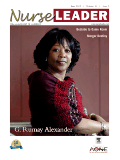
Nurse Leader
Scope & Guideline
Transforming Insights into Impactful Leadership
Introduction
Aims and Scopes
- Leadership Development:
A core focus on cultivating leadership skills among nurses, including mentorship programs, coaching, and innovative educational strategies to prepare the next generation of nurse leaders. - Workplace Health and Safety:
Exploration of strategies to create healthy work environments, including addressing workplace violence, promoting self-care, and enhancing employee well-being. - Diversity, Equity, and Inclusion (DEI):
Commitment to advancing DEI within nursing leadership, addressing systemic barriers, and promoting inclusivity in healthcare environments. - Evidence-Based Practice and Quality Improvement:
Encouraging the implementation of evidence-based practices and quality improvement initiatives to enhance patient care and operational efficiency. - Resilience and Adaptability in Nursing:
Focus on building resilience among nursing leaders and staff, especially in response to crises such as the COVID-19 pandemic. - Interprofessional Collaboration:
Emphasis on fostering collaboration between nursing and other healthcare disciplines to improve patient outcomes and operational effectiveness. - Innovative Care Models:
Investigation of new models of care, including telehealth and integrated care systems, to adapt to changing healthcare demands.
Trending and Emerging
- Mental Health and Well-Being of Nurses:
An increasing focus on the mental health and well-being of nursing professionals, including strategies to combat burnout and promote resilience in a high-stress environment. - The Role of Technology in Nursing:
Emerging discussions around the integration of technology in nursing practice, including telehealth, data analytics, and digital communication tools to enhance patient care. - Crisis Leadership and Management:
A significant rise in literature addressing crisis management and leadership in nursing, particularly in the context of the COVID-19 pandemic and its aftermath. - Community and Public Health Engagement:
Growing emphasis on the role of nurse leaders in community health initiatives and public health advocacy, particularly in promoting health equity. - Interdisciplinary Approaches:
An increased trend towards interdisciplinary collaboration in nursing leadership, highlighting the importance of teamwork across various healthcare professions. - Focus on Ethical Leadership:
Emerging discussions around ethical leadership practices, particularly in relation to social justice and equity in healthcare delivery.
Declining or Waning
- Traditional Hierarchical Leadership Models:
There appears to be a declining emphasis on traditional models of leadership that rely on strict hierarchies, as the focus shifts to more collaborative and inclusive approaches. - Single-Dimensional Leadership Training:
There is less emphasis on siloed leadership training programs that do not incorporate interdisciplinary or holistic approaches to nurse leadership development. - Static Work Environments:
The concept of static work environments is waning as the journal increasingly emphasizes flexible and adaptable strategies in response to changing healthcare dynamics. - Focus on Individual Competencies:
The journal has shifted away from a singular focus on individual competencies in leadership, moving towards a more systemic approach that considers organizational culture and dynamics. - Conventional Recruitment Practices:
Traditional recruitment practices are being overshadowed by innovative strategies that prioritize diversity, equity, and inclusion in workforce planning.
Similar Journals
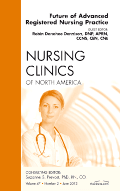
NURSING CLINICS OF NORTH AMERICA
Empowering healthcare professionals with cutting-edge insights.Nursing Clinics of North America is a premier peer-reviewed journal published by W B Saunders Co - Elsevier Inc, providing a vital platform for the dissemination of innovative research and clinical practice insights in the field of nursing and medicine. With an impressive impact factor reflecting its relevance in academic circles, this journal falls within the Q2 category in both Medicine and Nursing disciplines, showcasing its importance to professionals and researchers. Established in 1966 and continuing through to 2024, it offers valuable contributions across a wide array of topics, facilitated by its Scopus rank of #41 in General Nursing and a 70th percentile ranking, marking it as one of the leading publications in the field. Although not an open-access journal, it provides subscription-based access to critical information that supports advancing nursing knowledge and practices. The journal is dedicated to enhancing the skills and understanding of nurses, healthcare professionals, and students, making it an essential resource for those seeking to excel in nursing and allied health professions.

Clinical Nurse Specialist
Leading the Way in Specialized Nursing Insights.Clinical Nurse Specialist is a pivotal peer-reviewed journal published by Lippincott Williams & Wilkins that serves as a vital resource for nursing professionals seeking to enhance their knowledge and practice in advanced and specialized nursing fields. With an ISSN of 0887-6274, this journal has been a leading publication since its inception in 1987, providing insights into critical topics like assessment and diagnosis, leadership, and management in nursing. It ranks in the third quartile for multiple categories according to the 2023 rankings and has significant placements in Scopus rankings, highlighting the journal’s relevance and quality within its peer group. Although it does not currently have open access, its reach and impact are reflected in its robust contributions to nursing scholarship. Clinical Nurse Specialist is an invaluable resource for researchers, practitioners, and students aiming to stay abreast of the latest trends, evidence-based practices, and innovative solutions within the nursing profession.
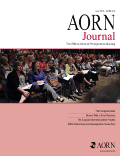
AORN JOURNAL
Empowering Excellence in Perioperative Nursing.AORN JOURNAL, a reputable publication in the field of Medical and Surgical Nursing, has been at the forefront of nursing education and practice since its inception in 1963. Published by WILEY, this peer-reviewed journal serves as an essential resource for nurses, educators, and healthcare professionals seeking to enhance their knowledge and skills in perioperative care. With an impressive ranking of 15th out of 26 in its category according to Scopus, and a Q2 rating in the 2023 category quartiles, the AORN JOURNAL consistently provides high-quality research, innovative practices, and evidence-based guidance. While currently not an open-access journal, it offers valuable insights and practical solutions to complex challenges in surgical settings, making it a crucial tool for advancing the nursing profession. The journal's commitment to fostering excellence in patient care continues to empower professionals and students alike, ensuring they stay at the leading edge of medical knowledge and practice.

Nursing Reports
Empowering Nursing Excellence Through ResearchNursing Reports is a prominent open-access journal dedicated to disseminating scholarly research in the field of nursing and healthcare. Published by MDPI since 2020, the journal is based in Italy and features an ISSN of 2039-439X and an E-ISSN of 2039-4403. With rapid advancements in nursing practices and education, the journal serves as a vital platform for researchers, professionals, and students to share innovative findings and insights that enhance patient care and nursing methodologies. Recognized for its quality, the journal is ranked in the Q2 category in Nursing (Miscellaneous) for 2023, alongside a respectable position in the Scopus ranks, holding place #53 out of 139 in General Nursing, placing it in the 62nd percentile. The journal's commitment to fostering a collaborative research environment is underscored by its open-access model, allowing for unimpeded access to cutting-edge nursing research worldwide. As "Nursing Reports" continues to grow from its inception into its converged years spanning from 2014 to 2024, it plays a crucial role in the progression of the nursing profession and the overall healthcare landscape.
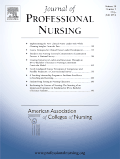
JOURNAL OF PROFESSIONAL NURSING
Advancing the Future of Nursing and Healthcare.JOURNAL OF PROFESSIONAL NURSING, published by W B SAUNDERS CO-ELSEVIER INC, stands as a leading scholarly resource in the field of nursing and general medicine. With an impressive impact factor and recognized as one of the top quartile journals in both Nursing and Medicine (Miscellaneous) for 2023, this journal serves as a vital platform for disseminating groundbreaking research and innovative practices within the nursing profession. Established in 1985, the journal has continually evolved, now converging its operations through 2024, thus ensuring access to the most contemporary and relevant insights. Researchers, professionals, and students are encouraged to explore its wealth of knowledge, which is critical for advancing both nursing education and clinical practices. While it operates under a traditional access model, the journal's premium quality content is accessible to all, enhancing its role as an essential resource in shaping the future of healthcare.
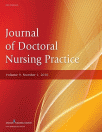
Journal of Doctoral Nursing Practice
Empowering practitioners with cutting-edge health policy research.The Journal of Doctoral Nursing Practice, published by SPRINGER PUBLISHING CO, serves as an essential platform for the dissemination of innovative research and best practices in nursing and health policy. With its ISSN 2380-9418 and E-ISSN 2380-9426, this journal is committed to advancing the field through rigorous peer-reviewed articles that contribute to both theoretical and practical advancements in doctoral nursing education and practice. Since its inception in 2016, the journal has provided a vital forum for scholarly work, currently holding a prestigious ranking of Q3 in Nursing (Miscellaneous) and Q4 in Health Policy. The journal emphasizes the significance of nursing research in influencing health policy and outcomes, making it a critical resource for researchers, practitioners, and students alike who aspire to enhance nursing practices and healthcare systems. With no Open Access option, access to its high-quality content reflects a commitment to academic rigor and integrity, ensuring that the work published is both impactful and credible.

Pielegniarstwo XXI Wieku-Nursing in the 21 Century
Exploring contemporary challenges in nursing practice.Pielegniarstwo XXI Wieku - Nursing in the 21 Century is an open-access journal dedicated to advancing the field of nursing research and practice. Published by DE GRUYTER POLAND SP Z O O, this journal provides a platform for innovative studies and discussions focused on contemporary nursing challenges and developments. Launched to further dialogue in nursing and health care, the journal has been freely accessible since 2016, reflecting the growing commitment to share knowledge without barriers. With an ISSN of 1730-1912 and E-ISSN 2450-646X, it serves a global audience of researchers, professionals, and students seeking to contribute to and learn from the latest findings in nursing. Despite its current Scopus ranking in the 10th percentile within the miscellaneous nursing category, the journal remains essential for fostering collaboration and improving nursing education in Poland and beyond. As part of its evolving scope from 2019 through 2024, Pielegniarstwo XXI Wieku aims to enhance the quality of care through evidence-based research and innovative nursing practices.

Nursing Open
Innovating nursing practice with every publication.Nursing Open is a premier open access journal published by WILEY, dedicated to advancing the field of nursing and healthcare research. With its ISSN 2054-1058, this journal has been at the forefront of disseminating innovative and impactful research since its inception in 2014. As an open access platform, it ensures that knowledge is accessible to all, promoting collaboration and engagement among researchers, practitioners, and students. Hailing from the United States and located at 111 River St, Hoboken, NJ 07030, Nursing Open has established itself as a vital resource in the nursing discipline, reflected in its impressive Q1 ranking in the 2023 category of Nursing (miscellaneous) and Scopus ranking of #36 out of 139 in General Nursing, placing it in the 74th percentile. With a commitment to high-quality research and a focus on contemporary issues in nursing, this journal invites contributions that foster evidence-based practice and enrich the global nursing community.
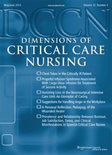
Dimensions of Critical Care Nursing
Advancing the Frontiers of Critical Care NursingDimensions of Critical Care Nursing, published by Lippincott Williams & Wilkins, is a premier journal dedicated to advancing the knowledge and practices within the fields of critical care and emergency nursing. With a distinguished history dating back to 1982, this journal plays a vital role in disseminating cutting-edge research, clinical advancements, and educational resources aimed at enhancing patient care in high-stakes environments. The journal is ranked in the Q2 quartile for both Critical Care Nursing and Emergency Nursing, reflecting its significant impact on the nursing field, with Scopus rankings placing it at #11 in Critical Care Nursing and #14 in Emergency Nursing. Targeting a multidisciplinary audience of researchers, clinicians, and students, the journal serves as a critical platform for discussions surrounding innovative patient care strategies, evidence-based practices, and emerging trends in critical nursing. Although it is not an open-access journal, it provides valuable insights that are essential for shaping the future of nursing practice. Stay informed on the latest research and contribute to the evolving landscape of critical and emergency care through Dimensions of Critical Care Nursing.
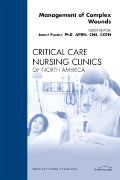
Critical Care Nursing Clinics of North America
Enhancing Patient Outcomes Through Expert Insights.Critical Care Nursing Clinics of North America, published by W B Saunders Co-Elsevier Inc, stands as a leading journal in the field of critical care nursing, showcasing groundbreaking research and essential clinical practices since its inception in 1989. With an ISSN of 0899-5885 and an E-ISSN of 1558-3481, this quarterly publication has earned its reputation within the Q2 category of critical care nursing, ranking 13th out of 27 in the Scopus metrics. Its contributions significantly aid healthcare professionals in enhancing patient outcomes in critical settings through the dissemination of evidence-based knowledge, innovative approaches, and expert insights. Although it does not offer an Open Access model, the journal remains dedicated to serving researchers, practitioners, and students in understanding advancements and best practices within this dynamic specialty, with a focus on improving the quality of care in critical nursing environments.